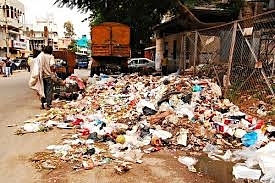
"Wow" Indeed!
How a group of inspired people in Bangalore ensured waste-segregation in their locality
It’s always heartening to hear a success story. When put together neatly on a storyboard, with all the bumps and hurdles edited out, it all looks so easy. However, the road to the destination is navigated step by step, one day at a time. Being the change that you wish to see in the world takes time, effort, and above all, determination.
The Wealth Off Waste (WOW) programme adopted by the residents of the 3rd block of Koramangala in Bengaluru is one such example. This program has completed four years and is still going strong. In its life, it bears testimony to the exemplary and united effort of all the folks involved.
Anil Chinniah, one of the key members of the programme, remembers how it all started in March 2011, much before Mandur became a flashpoint for Bengaluru’s mountains of garbage. Returning from overseas, he was disturbed by the trash strewn around. Noxious fumes from burning rubbish exacerbated his daughter’s asthma. Around the same time, the Koramangala 3rd block’s Residents’ Welfare Association was just shaping up. Under its umbrella, Anil and a few like-minded individuals, with a strong urge to do something about the environment, got together and began to chalk out a programme.
They got several things right.
Educate
In earlier days, when cloth bags were the norm and kitchen waste turned naturally into compost in backyards, the word “segregation” was unheard of, but was implemented in practice. However, with more trash being generated, segregation becomes key.
When toxic wastes are mixed with harmless organic waste, the entire waste mixture becomes toxic. Subsequently, when this toxic waste gets dumped in a landfill, the environment gets polluted. Apart from this, material that can be recycled gets contaminated, which renders it unfit for recycling.
Segregation at source would ensure that material would get recycled, organic waste would not become poisonous, and only a fraction of the entire garbage would end up in the landfill.
These facts were presented to the residents of Koramangala 3rd Block at a fun kick-off event, with coffee and biscuits to attract more participants. A strong case for segregation of garbage was made, keeping in view that the mind-set of the people needed to change to make this work.
Involve
Residents were involved right from the beginning. An army of 25-30 volunteers signed up to ensure the success of this programme. Most of them were women and children. There were door-to-door campaigns wherein rules were explained and doubts, if any, were cleared. There was no imposition of the programme; residents could choose to enroll. The enthusiasm of the volunteers rubbed off on the residents, and almost 25 streets enrolled.
More importantly, the key members actively engaged with workers who picked up the garbage, accompanying them on their rounds, addressing their issues, and providing all the required support. Incentives were also put in place to encourage the workers. Slowly but surely, the skepticism about the new programme was replaced with acceptance.
Sustain
The toughest part of any programme is the actual implementation. The initial euphoria and excitement at the launch soon fizzles out, and it becomes difficult to sustain. However, the WOW volunteers did a magnificent job of keeping the programme on track. Anil recalls how he would actually ride along in the auto with the garbage workers as they collected trash door-to-door. Checklists were made and filled up daily, by volunteers to keep track of residents who were enrolled in the programme. There was continuous monitoring of the waste-segregation. This effort continued till segregation became a habit. In the past four years, 100+ tonnes of dry waste has been collected and recycled. That is no mean feat!
Recognise
WOW has made it a point to recognize and appreciate the efforts of all involved. Whether it is through this video or annual felicitations of the workers, everyone receives a pat on the back, and the residents are reminded that it takes an entire community to make such a programme succeed.
The Future
The Koramangala 3rd Block RWA has been most supportive of the WOW program. Bringing the residents together as concerned and active citizens for different causes is its agenda, and it has made a big difference to the area.
Anil, in his latest update to the group, mentions that in four years, WOW has achieved a lot, and still more that can be done. The weekly collection is currently about 500 kgs, and they would like to set the target to 1 tonne per week.
Though BBMP’s involvement has at best been sporadic, they are picking up, and have developed a bio-gas unit to process 5 tonnes of wet waste on a daily basis. The NGO, Saahas, also has 1 tonne composting unit.
Taking a leaf out of this, if the success of the WOW programme in Koramangala 3rd Block could be replicated across the city, with the residents taking the lead in making our city a more habitable place, perhaps Bengaluru could lose its hateful moniker of Garbage City soon.